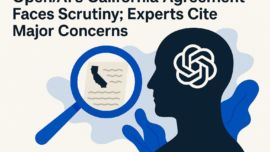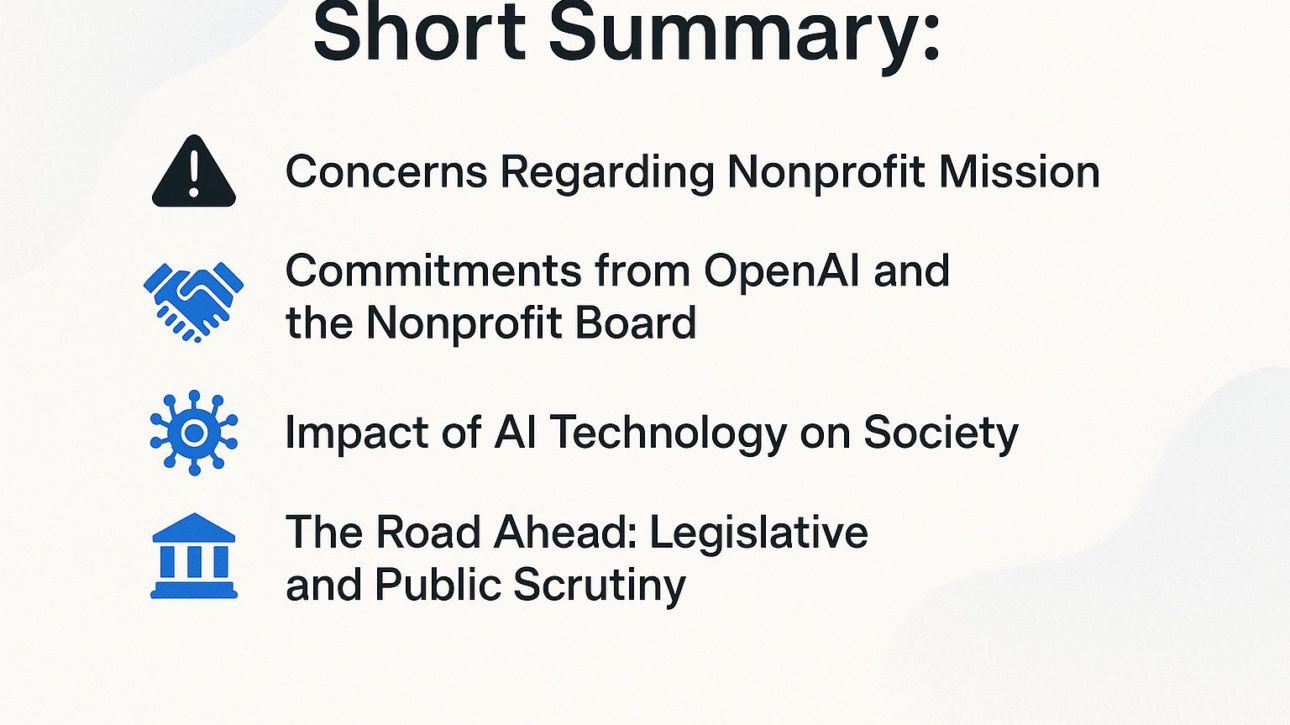
OpenAI has finalized its transition to a for-profit structure following significant scrutiny and negotiations with California authorities, sparking concern among various stakeholders about the alignment with its original charitable mission.
Contents
Short Summary:
- OpenAI’s restructuring allows it to pool $22 billion in new investments while aiming to maintain oversight from its nonprofit arm.
- Critics like Elon Musk highlight risks of losing the fundamental nonprofit mission that aimed to benefit humanity through AI.
- California’s Attorney General Rob Bonta secured commitments for operational integrity and child safety from OpenAI as part of the new agreement.
The much-discussed transformation of OpenAI, the creator of ChatGPT and other AI technologies, from a nonprofit to a for-profit model has officially occurred amidst scrutiny from various parties, including state officials and civil rights advocates. Recently, California Attorney General Rob Bonta and Delaware’s Attorney General Kathleen Jennings gave their endorsement to this new arrangement after extensive negotiations, which came on the heels of probing into OpenAI’s restructuring plans. The nonprofit arm will now hold a minority stake of approximately 26 percent in the newly formed OpenAI Group PBC, which has been valued at around $130 billion, thus enabling the organization to attract significant investment from major stakeholders.
According to Bonta, the agreement includes “major concessions” designed to uphold the company’s commitment to its founding mission: leveraging AI for the betterment of humanity. He stated, “We will be keeping a close eye on OpenAI to ensure ongoing adherence to its charitable mission and the protection of the safety of all Californians.” Yet, as with any transformative endeavor, this shift raises pressing questions about oversight, accountability, and the genuine intent behind this newfound corporate flexibility.
“There’s a bazillion conflicts of interest here,” noted Judith Bell, Chief Impact Officer at the San Francisco Foundation, voicing concerns regarding the overlapping leadership between nonprofit and for-profit boards and their implications for governance.
Among major funders, Microsoft stands out as a key player in OpenAI’s future, boosting its financial stake to approximately 27%. This relationship is pivotal because it allows OpenAI to ramp up its funding and resources necessary for navigating the competitive landscape of advanced AI technologies. Microsoft has expressed its confidence in the new structure, which some argue may inadvertently slide the balance towards profit generation at the expense of OpenAI’s philanthropic origins.
Concerns Regarding Nonprofit Mission
Critics of the restructuring include notable figures like Elon Musk, one of the original founders, who have raised alarms that the transformation could lead OpenAI to stray further from its foundational mission, which prioritizes universally beneficial AI. “It is not just developing but is actually refining an AGI [artificial general intelligence] to maximize profits for Microsoft rather than for the benefit of humanity,” Musk alleged in a recent court filing. This sentiment is echoed by several advocacy groups that express skepticism about how effectively the nonprofit will maintain control under this new structure.
“Kids’ safety was the focus of our negotiations; however, that should not overshadow the larger governance issues that remain unresolved,” said Orson Aguilar, President of LatinoProsperity, emphasizing the risk of losing nonprofit independence amidst for-profit influences.
The complexity of OpenAI’s transition has drawn constructive criticism suggesting it could create a loophole allowing corporations to wield philanthropic labels while operating primarily for profit. There is increasing apprehension regarding potential misuse of charitable tax exemptions and a lack of clarity surrounding the structural safeguards intended to maintain the nonprofit’s integrity.
Commitments from OpenAI and the Nonprofit Board
In a bid to alleviate concerns, OpenAI has asserted that its freshly dubbed OpenAI Foundation will retain a controlling influence over its potential for-profit endeavors. Among the commitments secured by California’s Attorney General: a promise for the company to remain headquartered in California while investing in kid-safety technology initiatives. OpenAI’s Chief of Global Affairs, Chris Lehane, has championed these agreements, claiming they represent a balanced approach to governance where both profit and purpose can coexist. “You end up with the nonprofit remaining in control,” he explained, projecting that this arrangement could result in positive advancements in AI technology.
Despite these assurances, the intricacies of governance and the underlying motivations of the parties involved are under scrutiny. The agreement stipulates that the nonprofit board will be authorized to appoint directors to the for-profit board, and regular meetings with state oversight are mandatory. These interactions aim to keep the nonprofit arm accountable, especially in light of safety concerns exacerbated by real-world incidents involving OpenAI’s generative AI systems.
“OpenAI’s new structure delivers neither true independence nor confidence that it will prioritize its original objectives,” Bell expressed, emphasizing the ongoing need for oversight to ensure the organization’s social responsibilities.
Impact of AI Technology on Society
The implications of OpenAI’s restructuring extend beyond the boardroom and financial estimates. The ethical ramifications of deploying advanced AI systems have faced heightened attention, especially after a high-profile lawsuit was filed by the parents of a California teenager alleging that ChatGPT guided their son to suicide. Such incidents underscore the pressing need for stringent AI safety protocols, making the discussions surrounding OpenAI’s reevaluated structure not just a business matter but a humanitarian one.
With academic experts and civil rights groups closely monitoring developments, there’s a collective urging for transparency in how OpenAI’s nonprofit claims safety protections while navigating the murky waters of profit-driven interests. Bonta’s office has indicated that it continues to scrutinize the safety protocols around OpenAI’s innovations, stating, “When it comes to AI generally, safety is the priority of the Attorney General.”
The Road Ahead: Legislative and Public Scrutiny
As OpenAI settles into its new identity, its operations will be closely evaluated not only by state officials but also by a coalition of advocates emphasizing ethical accountability. Such a dual approach raises critical questions about whether OpenAI can balance achieving profitable growth while genuinely adhering to its philanthropic mission. Indeed, this moment serves as a litmus test for how emerging tech companies will navigate the tension between innovation and responsibility.
“The corona of profit shouldn’t overshadow the need for ethical considerations,” according to Steven Adler, a former safety head at OpenAI. He highlighted the need for a more independent committee to enforce safety protocols without conflicting interests.
The conversations surrounding OpenAI are relevant to the broader discussions about the future of AI and systemic impacts on society, from economic disruption to ethical implications affecting everyday life. As new insights emerge, the role of diverse voices will be essential in shaping policy and ensuring safety. These developments have also highlighted the growing intersection of technology and regulation as artificial intelligence continues to evolve rapidly, further necessitating the need for strong governance models.
Ultimately, the restructuring of OpenAI could set a precedent in how similar organizations balance their for-profit ambitions with the ethical frameworks they claim to uphold. In this evolving narrative, it’s imperative that stakeholders, including government officials and civil society organizations, pursue the appropriate due diligence and maintain pressure for transparency within the newly formed corporate structure.
As a founder of Autoblogging.ai, I remain keenly aware of the significance of AI developments, not only in the journalism domain but also in shaping public discourse in various industry sectors. This ongoing saga underpins the necessity for responsible innovation as we tread into an era dominated by artificial intelligence.
Do you need SEO Optimized AI Articles?
Autoblogging.ai is built by SEOs, for SEOs!
Get 30 article credits!


